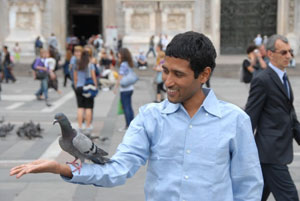by Ananda Giri: I was fourteen and studying in my ninth grade. Already in the last three years that I had studied at this school so many of my existing beliefs had been questioned and challenged.  I had been forced to enquire into the substantiality of the ideas on which most of my thinking was founded. A constant effort was made by my teacher to push my horizons further and even further.
I had been forced to enquire into the substantiality of the ideas on which most of my thinking was founded. A constant effort was made by my teacher to push my horizons further and even further.
Would there be a point in time when I would see the end of this ever-expanding horizon; when I could boldly claim that I have found it?
Would finding this ultimate truth mean that one has arrived at the destination with no need for any further enquiry or learning?
Could learning ever stop happening?
The more you learn, the clearer it becomes to you that learning is nothing but a process of unlearning.
And when you ask yourself, “what is this journey?” you realize there is a process of de-construction happening. A de-structuring of all those mental constructs that have been driving your perceptions, all those assumptions on which your divisive thinking is founded. It is in this awareness that you experience an unmistakable peace. It is this never-ending journey and the awareness of this never-ending journey that we call growth (growingggggg…)
Could I ever assume that I now see the real truth?
At fourteen it was my teacher who would never allow me to get fixated or attached to any one point of view and twenty years later I see my best friend and mentor, Krishnaji doing the same; never letting me assume the absoluteness of any view and pushing me to enquire and enquire even deeper into my assumptions. There is no end to growth. Life is a never-ending process of learning. And there is so much peace in this whole process.
It was another such day at the school when my teacher decided to push my horizons further and this meant more de-construction. We were together in the school garden, my teacher seated on a bench that was made of concrete while I sat on a small patch of grass right next to him. There was a five feet tall statue of a meditating Buddha in the middle of the garden. The Buddha was made of clay and painted green. The school children called this place the Buddha garden and many of the students spent their leisure hours relaxing in this garden. Buddha was a very honored figure in our school and we were all aware of his spiritual contributions to this world.
It was six in the evening and the sun was already beginning to go down. My teacher and myself were still seated at the same place quietly listening to the noise of the crows as they settled into their nests on the big old tamarind tree right behind us. Just as we were about to leave the garden for our rooms, we saw a young man rush towards us in some urgency and so we sat down again. He walked up to the teacher, paid his respects and sat right next to me on the little green patch. The man was in his mid thirties, a systems analyst by profession and had travelled from the city of Bangalore. He was quite an accomplished gentleman and was considered one of the top intellectuals in the city. He took a few moments to settle down and then started to speak.
“Sir, I am a good friend of one of the parents of this school and it was from him that I learnt about you and the school you founded. I am a serious Buddhist practitioner and a teacher of vipassana as well. I meditate regularly but there is this one question that has been bothering me for years now. I tried evading the question but it keeps coming back. I tried reasoning with it but still it remains. I am scared of this question… it makes me very insecure. I need an answer to this question and I need it now Sir. My friend mentioned to me that you are a very wise man and that you would be able to help me. Please help me Sir.”
My teacher, calm as always, gently enquired with the man about the question that troubled him and the seeker pointing to the tamarind tree behind us asked:
“HOW WOULD I KNOW THAT EVERYONE PERCEIVED THIS TREE THE SAME WAY THAT I PERCEIVE THIS TREE? I perceive this tree to be beautiful and even you call it beautiful but how do I know that your definition of beauty is the same as my definition of it? I say it is green in color and even you say it is green in color but how do I know your green is the same as my green? It is the same tree we are all looking at and our experience of it must be the same as well. I want to be sure that we all look at this tree the exact same way.”
The question appeared silly at first but as I closely observed the emotional state of the seeker as he spoke, it was quite obvious that his question was not just a question but an obsession. What was his obsession and what was the certainty he was looking for? Being part of a universe that is constantly changing and evolving, does it even sound reasonable to look for absolutes and certainties?
Responding to the seekers question my teacher said, “You can be certain that no one perceives the tree the exact same way that you perceive it.”
The seeker was expecting to hear an explanation different from this one as he was looking for certainty. He looked startled and disappointed at first, as he found no profound explanation to his question but appeared to have found peace eventually as the obsession for certainty was appeased. After a few minutes of silence, allowing the seeker to assimilate the shocking brief answer, my teacher continued with further explanation.
“Imagine for a moment that an elephant were looking at this tree, it would have a certain experience of that tree. Now imagine an eagle, a mosquito, a frog, a dog, a horse looking at the same tree, each would have their own unique experiences of that tree. Imagine a human, another human looking at this tree, they too would have their own unique perceptions of that tree. While each of us feel very certain about the truth of our experience, is it appropriate to assume that you have seen the Truth and this Truth that you have experienced must be the same for everyone else.”
The seeker came looking for certainty but realized that one cannot find certainty in an ever-changing universe. Whether he found peace or not depended on his willingness to look at the truth of this uncertainty and embrace this truth.
There is no questioning the truth or the validity of what one has experienced but to claim what you have seen to be absolute and the only truth for all cannot be true. Just because it feels real and certain does not mean it is absolute. If each one of us believed what we have seen to be the real truth (the only truth), is there then anything called the real truth. Could we then talk about one absolute truth for all? Each can only talk about their personal truth and their perception of reality.
If we are searching for a peace that will only be found in discovering the absolute truth, such a peace is highly questionable. It is doubtful if you will ever find that truth or that peace.
Searching for the one reality that underlies all our experiences would be more like, as many great teachers have quoted in the past, ‘a blind person searching for a black cat in a dark room that does not exist’, and therefore it shall never be found. This search for one reality that underlies all reality is a futile search. The only possible outcome of this futile search is a probable satisfaction arising from ones heroic endeavor for the truth or equally probable is the chance for a deep discontent arising from not having found it; In any case you have not found the freedom or peace that you were hoping to find.
There is no fundamental truth to be discovered, whether it is in respect to yourself or this universe.
Could this idea of one absolute truth be the cause of most religious conflicts???
Theoretically speaking all seven billion people inhabiting our world could have seven billion unique experiences of the transcendental. There are endless varieties of religious and spiritual experiences possible and each of these experiences is equally true and extraordinary. Just because one feels very certain about the truth of what one has experienced does not mean, that this one persons truth has to be the same for the rest of humankind. Trying to establish any one view as the absolute view and expecting all of humankind to embrace that truth is the likely cause for most religious conflicts.
I do not know how appropriate it would be for me to impose my perception of the truth or my experience of reality on my fellow humans. This in my opinion is tantamount to violence.
An attempt to unite humankind under one common belief or an idea may prove to be futile.
Is such unification possible at all when there is no such thing as one absolute truth? Each of us is unique, our perceptions are unique, our experiences are unique and therefore our responses to life will be unique as well. There can be no uniformity in our perceptions or our experiences. Lack of uniformity does not necessarily suggest a lack of unity.
True unity is in realizing the beauty of diverse perceptions. True unity is in realizing that all views are equally true and equally valid.
There is a place for all in this world. There is a place for all views. There is no need to feel insecure about another’s different point of view or expression. Living on a planet that accommodates all, it doesn’t make sense that one is intolerant to another’s views.
We need a mind that is spacious in order to love or be tolerant. Such a spacious mind is possible, only if one chooses to live a life of awareness.








































